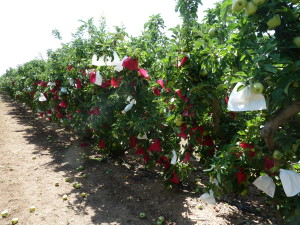Plastic has become fundamental in agriculture. The total consumption of plastic films for agricultural purposes in Europe exceeded 500.000 metric tons in 2013. Existing semi-intensive and intensive farming practices require the use of large quantities of plastic mulching film and fruit protection bags (and clips to close them) as they help prevent the growth of weeds, protect crops from insects, regulate soil, create a beneficial micro-climate and retain water and nutrients. However, this plastic is not usually recycled (since it is time-consuming and expensive), but rather burned or buried in soil, causing extreme environmental damage.
 LIFE MULTIBIOSOL, a project co-funded by the European Union, aimed to develop a new bioplastic film made from renewable, raw materials that are not petroleum-based. AITIIP Technological Centre teamed up with CAA, Transfer Consultancy, PCTAD, EEAD-CSIC, ARCHA, and GroenCreatie to develop solutions (mulching film, fruit protection bags & clips) that are both technically and economically viable.. 3 bioplastics (black mulching film, red and white fruit protection bags) were developed, all of which have obtained the OK Biodegradable Soil Certification.
LIFE MULTIBIOSOL, a project co-funded by the European Union, aimed to develop a new bioplastic film made from renewable, raw materials that are not petroleum-based. AITIIP Technological Centre teamed up with CAA, Transfer Consultancy, PCTAD, EEAD-CSIC, ARCHA, and GroenCreatie to develop solutions (mulching film, fruit protection bags & clips) that are both technically and economically viable.. 3 bioplastics (black mulching film, red and white fruit protection bags) were developed, all of which have obtained the OK Biodegradable Soil Certification.

Over the course of 3 years, the developed bioplastics were rigorously tested in both laboratory and field environments. Results indicate that the products are easy to apply, require no removal from the field post-harvest, and upon biodegrading into the soil they contribute important nutrients for improved plant and soil health. Overall the project addressed and achieved the following objectives:
Elimination of waste management
Our biodegradable plastics break down naturally on land (with OK biodegradable SOIL certification) so removal and transportation of the waste is no longer needed. Costs of management for farmers/growers and the environmental problems associated with landfills and incineration are therefore eradicated
Development of new biodegradable plastics films with a very low carbon footprint impact
The advanced bioplastics developed in this project have a significantly lower Co2 footprint than conventional plastics since our biodegradable polymers and additives are made from renewable raw materials that are not petro-based.
Improvement of soil and product quality
Multibiosol bioplastics not only avoid the toxic components present in conventional agricultural films, they also add value through Oligo Elements (trace minerals as natural fertilizers) and micro-perforation functionalities that contribute to agriculture à la carte and help improve the health of the soil and the quality of the final product.
To learn more about the project in detail, download the Layman’s Report. For more information about the project and the advanced bioplastics produced, visit our website or contact us directly at projects@transferconsultancy.com

Text by Priya Devasirvatham


